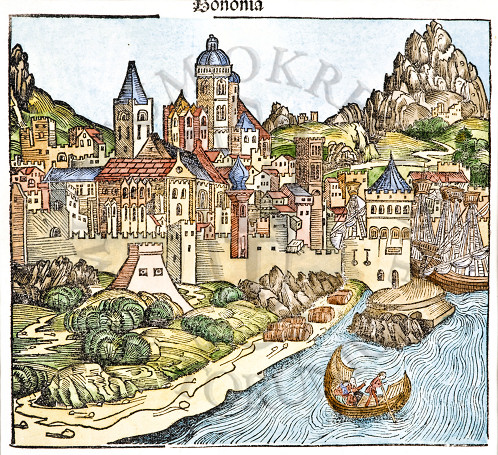
Copernicus as a student in Bologna
After an unsuccessful attempt to secure a Frombork canonry for his nephew,
the Bishop of Warmia, Lucas Watzenrode, decided in the summer of 1496 to
send him to Bologna University. Founded in the 11th c. Bologna Law School
enjoyed a very good
 reputation especially among rich Prussian scholars
such as Lucas Watzenrode who had studied there in the early 1470s. Watzenrode
was awarded a degree in Canon Law in 1473 and later worked as a lecturer
there for a short time, hence his strong conviction that a juristic education
would improve his nephew’s chances in his pursuit of a Frombork canonry
and a successful ecclesiastical career in the future.
reputation especially among rich Prussian scholars
such as Lucas Watzenrode who had studied there in the early 1470s. Watzenrode
was awarded a degree in Canon Law in 1473 and later worked as a lecturer
there for a short time, hence his strong conviction that a juristic education
would improve his nephew’s chances in his pursuit of a Frombork canonry
and a successful ecclesiastical career in the future.
In October 1496 Copernicus enrolled at Bologna Law School. At first he took up lodgings close to Porta Nuova to later move, along with his brother, closer to the Faculties of Mathematics and Astrology located in the vicinity of San Salvatore. At the beginning of January 1497 he entered his name in the register of the German jurist student corporation (or ‘nation’) comprising young German-speaking scholars of different nationalities, namely, Czechs, Poles, Lithuanians, Hungarians and Danes. In October the same year Copernicus received the long-awaited Frombork canonry and from then on the costs of his studies were covered by the chapter.
Not much is known about the successive stages in his education but it should be assumed that before becoming a student of Civil and Canon Law he must have become a ‘Master of Liberal Arts’. Copernicus did his best to gain a thorough knowledge of Roman Law (ius civile), studying its version as revised by Emperor Justinian (Digesta, Institutiones, Codex Justinianus and Novellae) and as interpreted by such medieval glossers and commentators from Bologna as Bartolus de Saxoferato and Baldus de Ubaldi. Lucas Watzenrode’s nephew must have spent an equal amount of time and energy on delving into the intricacies of Canon Law (ius canonici), so useful for his future ecclesiastical career, studying the Decretum Gratiani (12th c.), Gregory IX’s Decretales, Boniface VIII’s Liber Sextus, Clement V’s Clementinae, and John XXII’s Extrav’agants. Among Copernicus’ professors of law were many distinguished humanist scholars including the Latinist Filippo Beroaldo the Elder, Hellenist Antonio Urceo called Codrus, Antonio Burgos, Bartolomeo Bolognini and the philosopher Alessandro Achillini (1463-1512). The latter, who though a staunch defender of Aristotle, believed in empirical research and was critical of the Ptolemaic system.
Presumably, Copernicus started reading Greek and medicine at the Faculty of Arts (artes). He did not abandon his beloved astronomy though and conducted some observations which confirmed his earlier reservations about the geocentric model of the universe while he befriended Professor Domenico Maria Novara of Ferrara (1454-1504) whom he assisted in his astronomical observations. Together they went to Rome in the jubilee year of 1500 where, according to Georg Joachim Rheticus, Copernicus not only conducted observations but also lectured on a subject the content of which Rheticus did not specify.
Nicolaus Copernicus University